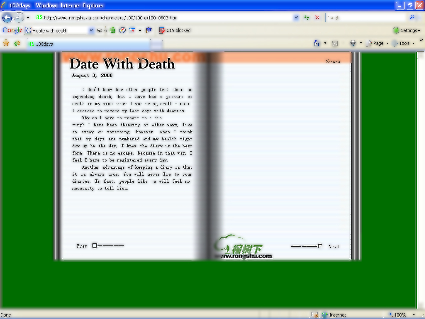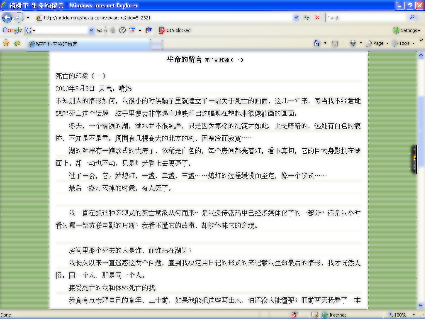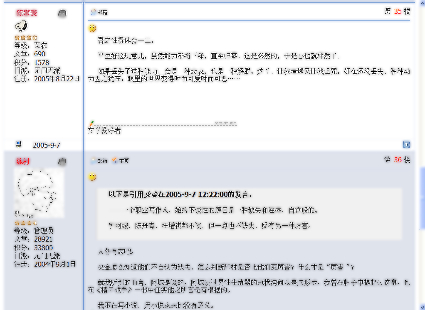
Electronic Literature in the People's Republic of China
by: Michel Hockx
This short essay surveys the main trends in electronic literature in the People’s Republic of China (PRC). It is interesting to compare the situation in the PRC with western trends because the PRC context is unique: electronic literature is much less marginal there than it is in many western countries, yet at the same time it is also much more restricted by censorship. Since the censorship issues have been highlighted in many scholarly publications(Note 1) and have had massive media exposure(Note 2) outside the PRC, this essay will mainly focus on the other side of the coin: the unrivalled popularity and cultural significance of electronic literature inside the PRC. In short: unlike most treatments of the Internet in China, I shall focus on what does get published, rather than on what does not.
The Internet in China
It is well known that the number of Internet users in China is growing at an exponential rate. According to the latest statistics published by the China Internet Network Information Center (CNNIC) [http://cnnic.cn/en/index/index.htm], there were 162 million Internet users in China on 30 June 2007, with the growth rate representing an average of 100 new users per minute. Literary production abounds and the term wangluo wenxue (literally “network literature”) is part of most young intellectuals’ everyday vocabulary. It has also been the subject of extensive nationwide critical debate, about which more below. The history of Chinese electronic literature is in the process of being written although to the best of my knowledge there is no PRC equivalent to the Electronic Literature Organization [http://eliterature.org/] attempting to maintain a comprehensive archive of online literary production.
The history of Chinese electronic literature
Not surprisingly the first Chinese-language literary works to appear online were produced by Chinese students in the USA, at a time when the Internet was not yet available in China itself. Emerging canonization processes credit the journal China News Digest – Chinese Magazine (Huaxia wenzhai) with publishing the first Chinese-language works of literature on the internet. These were standard linear works of prose and poetry included as part of a Chinese-language publication that was distributed by e-mail and that is still in existence [http://www.cnd.org/HXWZ/]. Chinese-language newsgroups, such as alt.chinese.txt emerged around the same time and also published literary work. None of these works featured any use of interactivity or multimedia. Apart from the method of publication, they were no different from printed works.
The first users inside China to obtain internet access were staff and graduate students on university campuses, who launched several literary Bulletin Board Systems (BBS) after the mid-1990s. Websites devoted to literary production emerged from 1997 onwards and in 1999 the first commercially operated website for creative writing was launched in Shanghai. This website is called Rongshuxia, which somewhat awkwardly translates into Under the Banyan Tree and still exists [http://www.rongshuxia.com]. Its latest usage statistics date from 2005 and claim a membership of 4.5 million, daily page views of over 7 million and an online database of more than 3 million works of creative writing.(Note 3)
Under the Banyan Tree shot to nationwide fame in 2000 when a man called Lu Youqing started submitting regular posts to one of its discussion forums in order to chronicle the last days of his life, as he was dying of cancer. The “Diary of Death”, as it was soon called, attracted huge numbers of readers and responses and was eventually given its own home on the site, where it remains today [http://www.rongshuxia.com/channels/zl/diediary/diary.html]. A partial English translation remains available on the site, under the title “Date with Death” [http://www.rongshuxia.com/channels/zl/100/100-e/100_eindex.html].
Characteristics of PRC electronic literature
Lu Youqing’s diary and the website Under the Banyan Tree are good starting points for a brief discussion of some of the characteristics of PRC electronic literature as it has developed over the past decade or so. The vast majority of PRC electronic literary production takes place in the context of literally millions of online discussion forums (often still referred to as BBS, although this is technically the wrong term), which allow users to submit literary works and comment on other people’s work. The typical format for these works of electronic literature is the thread format. A thread is started by an author submitting a work (or an installment of a work) and is extended by readers commenting and the author responding, with all comments and responses being added to the same text under the same heading. Whenever a new response is added, the thread reappears at the top of the forum list and is thus kept “alive”. In some instances, appreciating readers of a particular thread will simply submit the word “Up!” as a comment, thereby sending the thread back up the list. The format allows for the use of multimedia and often avatars and photographs are included in the posts but in formal terms the most experimental element of this literature is its interactivity: many of the threads become multi-authored texts as they develop over time and they are potentially open-ended, although in some cases forum moderators will decide to close certain threads after a certain period of time and file them away in a different part of the site.
Already in the days of Under the Banyan Tree, and still nowadays, there were clear links between the worlds of electronic literature and print literature. Under the Banyan Tree made those links most explicit through elements of its Graphic User Interface, which would make posts appear either as pages in an open book or as printed on lineated pages of paper. This is demonstrated by the two screenshots from Lu Youqing’s “Diary of Death” below.


There is a kind of cross-fertilization between electronic literature and printed literature at work in the present-day PRC, which is evident not only from the examples above but also, for instance, from the fact that most bookshops reserve separate sections for printed works of “network literature”. That is to say, if a literary work was published and achieved fame online before it was printed, it will carry with it into print culture a genre label that reminds its readers of the electronic origins. Most of these works are novels, prose collections or poetry collections that might just as easily have been placed on the bookshop shelves for novels, prose or poetry, but this is not normally the case. “Network literature” has become a new genre of modern Chinese literature.
Apart from relatively popular or commercial publications such as the ones described above, many avant-garde literary groups, especially poetry groups, prefer to use online discussion forums as their main avenue of publication.(Note 4) Discussion forums have almost completely replaced the previously very lively scene for semi-official literary magazines (sometimes referred to as “underground literature”, meaning publications not officially registered with the relevant authorities). In poetry, especially, it is by now generally accepted in critical and academic circles that the online poetry scene is the country’s most significant avant-garde. Many established poets and critics have joined this scene and, conversely, products from this scene also find their way into print.
Generally speaking, achieving publication in print is still a measure of success for most producers of electronic literature in China. The typical route towards success is as follows: an author contributes a work to a discussion forum; the work attracts many readers and comments and remains at the top of the discussion board for a long time; the forum moderators recognize the value of the work by including it in a “best of….” section of the website (where the thread can only be read but no longer added to); the editors of the site’s webzine include the work in one of their issues (and remove all the comments and additions from the thread, leaving only the “original work”; the webzine gets published in print; the author becomes known in print culture circles; the author publishes printed work. The various stages of the process clearly show how the text is “normalized” for consumption in print culture. There is, of course, also more innovative work to be found that tries to work against these processes.
Innovative work
It is difficult to assess whether or not there is much innovative work being done in China outside the sphere of online discussion forums or blogs. The kind of self-contained works by individual named authors experimenting with hypertext technologies and specialized software that makes up the bulk of what can be found in the archives of the Electronic Literature Organization is not easily found on PRC websites. This is perhaps partly because of the high start-up costs of such types of creations, but it is worth noticing that there are also cultural factors at work. Modern Chinese writers throughout the last century or so have generally shied away from the western modernist paradigm that emphasizes the unique individual nature of each literary work as well as the elevated status of the author as “Creator”. Instead, modern Chinese authors have preferred to be engaged in a low-cost, high-speed literary economy where it was more important to publish regularly and be in constant contact with one’s readership. Much of modern Chinese literature has traditionally been published (or serialized) in magazines and newspapers, before it went online, with print publications often following without further revision of the text. Some Chinese writers and some critics consider this preference for rapid production and constant exposure to be a remnant of traditional Chinese literary practices, which saw members of the literati elite produce a steady stream of shorter texts on a wide variety of topics (called biji or “random notes”) throughout their careers. Aesthetic principles and tastes in China are determined to some extent by these traditions, which, for instance, also explains why the short prose essay, so marginal a genre in the West these days, is still one of the most popular forms of writing in China today.
The most innovative “network writers” in China today can be seen to experiment with the opportunities offered by interactive technology to develop further this tradition and these tastes. Most noteworthy is the work of Chen Cun, a Shanghai-based author who was one of the founders of Under the Banyan Tree but has since moved on to other sites, including one he moderates himself. Chen Cun was already an established print author when Chinese electronic literature took off and he has since been increasingly active in cyberspace and has consistently argued for a type of electronic literature that overthrows the print paradigm. In recent work, such as the long discussion forum thread entitled “Random Notes on Sex” (xing biji) [http://bbs.99read.com/dispbbs.asp?BoardID=18&replyID=190863&id=21198&skin=0], Chen harks back to the traditional biji genre while making full use of the possibilities of cyber-writing.

He started the thread with a flurry of short posts, some including images and sound files, on 7 September 2005. Comments and additions from other users of the site soon followed. Different from most forum authors, however, Chen did not turn the next installment of the work into a new thread, but added it to the same thread. This made a crucial difference in that the longer the thread became, the more interactive it was, with author and readership constantly discussing the work and the work itself changing under the influence of comments being made. The result was a thread that stayed at the top of the forum for more than half a year, when Chen himself used his moderator’s privilege and declared it closed. Ironically, the last post that was contributed to the thread was from a reader begging Chen to continue it. The “Random Notes on Sex” thread and other similar works initiated by Chen could not possibly be reduced to an “original work” in the way described the previous section. If one were to take out the comments and responses and leave only Chen’s text, much of it would not make sense as Chen was often responding directly to his readership. It is a multi-authored, interactive work that, although linear in much of its content, could not be recreated in print.
Conclusion
Interactive discussion forums are widely used in western countries as well and there are plenty of such forums devoted to literature. However, the social community aspect of these sites often prevents them from being considered innovative, avant-garde or “important” in western critical circles, where lingering print culture paradigms determine that “important” works of electronic literature (i.e. those worth archiving) must be self-contained creations by individual named creators. In the People’s Republic of China, and possibly in other parts of the Chinese reading world as well, innovations are moving into a different direction, employing the interactive features of web writing in order to produce unstable, multi-authored threads of writing and images that encourage participation and that involve their readership in new literary and aesthetic experiences.
- Wikipedia has a good overview article on internet censorship methods in the PRC [http://en.wikipedia.org/wiki/Internet_censorship_in_the_People's_Republic_of_China]. An in-depth study was undertaken by the open net initiative in 2004-2005 [http://www.opennetinitiative.net/studies/china/].
- Recent examples of hyped up media reporting on PRC internet censorship include the criticism of Google for filtering search results from http://www.google.cn (when most media forgot to mention that http://www.google.com is freely accessible to anyone in China as well) and the ongoing misleading reporting about the closure of internet cafés in China (they are still to be found on virtually every street corner in every big city and they are populated almost exclusively by online gamers, not by would-be dissidents).
- Information taken from http://www.rongshuxia.com/channels/gy/new/index.html. I myself registered for the site in 2002 and submitted a poem I wrote in Chinese around the same time to explore the editing and publication process. As promised I received feedback from one of the editors within a week, explaining why regrettably my contribution could not be published due to poor expression. The poem was stored in my own "space" on the website but disappeared two years later, although the space itself continues to exist. This means that the statistic of 3 million works in the site database presumably includes only a fraction of the works submitted and stored at least temporarily since the website was founded.
- A very helpful list of avant-garde poetry websites in China is maintained by Michael Day on the Digital Archive for Chinese Studies website, where some forums are also archived [http://leiden.dachs-archive.org/poetry/websites.html].